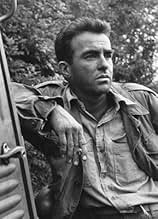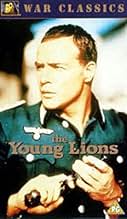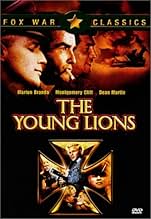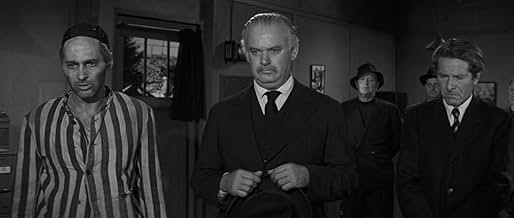IMDb रेटिंग
7.1/10
9.3 हज़ार
आपकी रेटिंग
अपनी भाषा में प्लॉट जोड़ेंThe lives of three young men, a German and two Americans, during WWII.The lives of three young men, a German and two Americans, during WWII.The lives of three young men, a German and two Americans, during WWII.
- 3 ऑस्कर के लिए नामांकित
- 1 जीत और कुल 7 नामांकन
John Alderson
- Cpl. Kraus
- (बिना क्रेडिट के)
John Banner
- German Town Mayor
- (बिना क्रेडिट के)
Stephen Bekassy
- German Major
- (बिना क्रेडिट के)
फ़ीचर्ड समीक्षाएं
A long time ago, some time before the powers that be decided that movies should be made only to extricate money from children by catering to their base instincts and in so doing destroy our civility, the American Cinema was devoted to the art and craft of story telling. In these stories, life was often celebrated through the study of the character of the human heart.
In THE YOUNG LIONS, we experience masterful story writing in the screenplay by a man named Edward Anhalt who adapted it from a novel by Irwin Shaw. In this fine example of the final years of the Golden Age of Hollywood we see a study of character, ideas and humanity seen amidst the greatest conflict this Earth has ever known, WWII.
Here, we experience both the Americans and Europeans, including Germans. They are played as they really were, not as depicted by latter day directors such as Steven Spielberg and others who have drawn WWII Germans as silhouette, cartoon characters, all vile and evil. Here, they are shown as singular human beings with personalities, hopes and dreams really exactly like our own. The opposing forces are caught up in a madness that somehow swept across the face of this planet at a specific time, when really probed, for reasons quite unfathomable. This was also one of the peak film renderings of Marlon Brando, whom some feel is one of the finest actors ever to have graced the silver screen.
If you yearn for a fulfilling example of American Cinema at a time when it was a serious, respected industry, this is one for you to see.
In THE YOUNG LIONS, we experience masterful story writing in the screenplay by a man named Edward Anhalt who adapted it from a novel by Irwin Shaw. In this fine example of the final years of the Golden Age of Hollywood we see a study of character, ideas and humanity seen amidst the greatest conflict this Earth has ever known, WWII.
Here, we experience both the Americans and Europeans, including Germans. They are played as they really were, not as depicted by latter day directors such as Steven Spielberg and others who have drawn WWII Germans as silhouette, cartoon characters, all vile and evil. Here, they are shown as singular human beings with personalities, hopes and dreams really exactly like our own. The opposing forces are caught up in a madness that somehow swept across the face of this planet at a specific time, when really probed, for reasons quite unfathomable. This was also one of the peak film renderings of Marlon Brando, whom some feel is one of the finest actors ever to have graced the silver screen.
If you yearn for a fulfilling example of American Cinema at a time when it was a serious, respected industry, this is one for you to see.
`The Young Lions' is the Second War II presented through the participation of three soldiers. Christian Diestl (Marlon Brando) is an idealistic German, son of a shoemaker. He joins the Army believing that life could improve in Germany under the administration of the Nazis. However, being a soldier, he cannot accept `acting like a police' in an occupied Paris and requests transference to the front, where he has another disappointment with the cruelty of the war. Noah Ackerman (Montgomery Clift) is a shy American Jew, a very simple man, just married with Hope Plowman (Hope Lange) and very discriminated in his platoon for being Jew. He goes to the war and leaves his family. Michael Whiteacre (Dean Martin) is a successful actor who became friend of Noah while in New York and is also obliged to join the army and go to London. There, he decides to leave the office activity and join his platoon in the front. This movie is excellent. It shows common people being used by government in a senseless war. All the main characters are peaceful common persons: Christian is a very simple person, wishing to climb socially in life in a Germany without opportunities and is misguided by the speech of Hitler and pretty soon he becomes aware how stupid war is. Noah is also a very simple person, a salesman from a department store, who indeed wishes to be with his family and join the Army just for obligation. And Michael is a selfish actor and bon vivant, without any sense of patriotism and who is not interest in anything but to have his life back. These characters are put together in a stupid war, having to kill persons to save their lives and to obey orders, which they do not agree. This movie is an excellent perspective of the stupidity of a war. My vote is eight.
An interesting vision of young men in war. The idealist, the shy and the playboy get to war. All will be changed by the horror of the conflict, not only with enemy troops, but within their ranks.
Lt. Christian Diestl's (Marlon Brando) sense of honor and gentle behavior clashes with the cruel, senseless attitude of his superior, Capt. Hardenberg, realistically played by Maximilian Schell.
Private Ackerman (Montgomery Clift) a shy unassuming Jewish boy becomes a courageous soldier, opposing both enemy soldiers and the bigotry of their comrades.
Private Withacre, a playboy who tries to avoid duty (Dean Martin), finally ends up resigning a safe post to join the fighting in Normandy, and becoming a soldier.
The usual Black and White shooting enhances the cruelty of WWII. If you find it, don't miss this performance by great actors.
Lt. Christian Diestl's (Marlon Brando) sense of honor and gentle behavior clashes with the cruel, senseless attitude of his superior, Capt. Hardenberg, realistically played by Maximilian Schell.
Private Ackerman (Montgomery Clift) a shy unassuming Jewish boy becomes a courageous soldier, opposing both enemy soldiers and the bigotry of their comrades.
Private Withacre, a playboy who tries to avoid duty (Dean Martin), finally ends up resigning a safe post to join the fighting in Normandy, and becoming a soldier.
The usual Black and White shooting enhances the cruelty of WWII. If you find it, don't miss this performance by great actors.
"The Young Lions" was one those big Hollywood war movies I remember seeing with my family at the local cinema during the late 1950s.
I saw many of those films and actually read most of the slab-like novels they were based on: "Battle Cry", "The Man in the Gray Flannel Suit", "From Here to Eternity" and Irwin Shaw's "The Young Lions" - there just weren't that many competing devices back then.
I usually read the books after seeing the films and then became acutely aware of how the movies suffered under the censorship of the day. The novels often filled in some serious gaps in my sex education, but the films never did.
The story is about three soldiers: a German, Christian Diestl (Marlon Brando), and two Americans: Noah Ackerman (Montgomery Clift) and Michael Whiteacre (Dean Martin). The film follows their fortunes through WW2 until they cross paths at the end.
The film has a number of authentic, well-executed sequences shot on location. However these are mixed with flat, over-lit scenes shot on the blandest of backlots and soundstages - the interiors are particularly artless. Documentary footage also added to the lack of a definitive style.
Fortunately the action scenes open the film out. The most arresting of them was the ambush of a British convoy in North Africa. It would have touched a nerve with many in that audience in 1958 as our guys had been part of the British Eighth army and the war had only been over for 13 years.
One of the surprises in the movie was the anti-Semitism Noah Ackerman encounters in the U.S. Army. Monty Clift faced a tough enlistment in "From Here to Eternity", but it was even tougher here. He looked worn (this was after his accident in 1956) and seemed a bit too old, but his performance is the most affecting in the film. No wonder Brando was wary of his talent.
Dean Martin without Jerry Lewis was another surprise, but he was good as the soldier with better motives than he thought.
Brando's blonde, broad shouldered Diestl starts out as a fine example of the master race, but his journey through the rise and fall of the Third Reich makes him thoughtful. He is treated rather sympathetically in the movie, although he was more of a nasty Nazi in the novel. However they may have overdone Diestl's disgust at every turn.
I can see why Irwin Shaw was disappointed. However the film has its moments, and is still one I have no trouble watching every now and then.
I saw many of those films and actually read most of the slab-like novels they were based on: "Battle Cry", "The Man in the Gray Flannel Suit", "From Here to Eternity" and Irwin Shaw's "The Young Lions" - there just weren't that many competing devices back then.
I usually read the books after seeing the films and then became acutely aware of how the movies suffered under the censorship of the day. The novels often filled in some serious gaps in my sex education, but the films never did.
The story is about three soldiers: a German, Christian Diestl (Marlon Brando), and two Americans: Noah Ackerman (Montgomery Clift) and Michael Whiteacre (Dean Martin). The film follows their fortunes through WW2 until they cross paths at the end.
The film has a number of authentic, well-executed sequences shot on location. However these are mixed with flat, over-lit scenes shot on the blandest of backlots and soundstages - the interiors are particularly artless. Documentary footage also added to the lack of a definitive style.
Fortunately the action scenes open the film out. The most arresting of them was the ambush of a British convoy in North Africa. It would have touched a nerve with many in that audience in 1958 as our guys had been part of the British Eighth army and the war had only been over for 13 years.
One of the surprises in the movie was the anti-Semitism Noah Ackerman encounters in the U.S. Army. Monty Clift faced a tough enlistment in "From Here to Eternity", but it was even tougher here. He looked worn (this was after his accident in 1956) and seemed a bit too old, but his performance is the most affecting in the film. No wonder Brando was wary of his talent.
Dean Martin without Jerry Lewis was another surprise, but he was good as the soldier with better motives than he thought.
Brando's blonde, broad shouldered Diestl starts out as a fine example of the master race, but his journey through the rise and fall of the Third Reich makes him thoughtful. He is treated rather sympathetically in the movie, although he was more of a nasty Nazi in the novel. However they may have overdone Diestl's disgust at every turn.
I can see why Irwin Shaw was disappointed. However the film has its moments, and is still one I have no trouble watching every now and then.
I have seen this movie several times and catch something different every time I see it. Today is the first time I've seen it from the beginning. In the context of the time it was made, it was a bold statement about the human factor in any war. Brando shines and plays a sympathetic character who sees first hand the evil that men do in the name of patriotism.
Made at a time when the Americans that liberated the concentration camps were in their prime and there weren't any idiots running around claiming it was a lie, we see how ordinary citizens respond to the unthinkable. Brando's character stands in for the citizens of the Reich who claimed they were clueless about the genocide while the ashes from the smokestacks fell like snow on their towns. We see the horror and the denial.
It briefly explores a major taboo--interracial/interfaith marriages. It looks at racism in the context of anti-Semitcism (unfortunately still alive and well in America) and one man's courage in opposing it. Ironic this brand of racism, as the founder of the prevelant religion in America was a Jewish rabbi.
This movie is worth the 3 hours of time; it would make a great set piece with "Judgement at Nuremberg" which also showcases the talents of many of the actors from this film.
Good acting from all players in this film. It presages Robert Altman with the interweaving of the characters' lives from the first shot where Barbara Rush and Brando debate the merits of the Fatherland to the last scene in the forest where the end comes full circle.
Made at a time when the Americans that liberated the concentration camps were in their prime and there weren't any idiots running around claiming it was a lie, we see how ordinary citizens respond to the unthinkable. Brando's character stands in for the citizens of the Reich who claimed they were clueless about the genocide while the ashes from the smokestacks fell like snow on their towns. We see the horror and the denial.
It briefly explores a major taboo--interracial/interfaith marriages. It looks at racism in the context of anti-Semitcism (unfortunately still alive and well in America) and one man's courage in opposing it. Ironic this brand of racism, as the founder of the prevelant religion in America was a Jewish rabbi.
This movie is worth the 3 hours of time; it would make a great set piece with "Judgement at Nuremberg" which also showcases the talents of many of the actors from this film.
Good acting from all players in this film. It presages Robert Altman with the interweaving of the characters' lives from the first shot where Barbara Rush and Brando debate the merits of the Fatherland to the last scene in the forest where the end comes full circle.
क्या आपको पता है
- ट्रिवियाMontgomery Clift was widely felt to look too old and unhealthy to be an A1 soldier. Although Clift was only 36 during filming, this was the first full film he had made since his near-fatal 1956 car accident (it occurred during filming of Raintree County (1957)), which had drastically altered his appearance.
- गूफ़Early in the movie, Marlon Brando's character is riding in some sort of staff car. The car is right-hand drive; the Germans did not use right-hand drive. However, the staff car is a French-made Laffly V15T, which is, indeed, right-hand drive and was used by the French Army in WWII. The vehicle was probably captured from the French Army.
- भाव
Michael Whiteacre: You want me to get shot. Look, I've read all the books. I know that in 10 years we'll be bosom friends with the Germans and the Japanese. Then I'll be pretty annoyed that I was killed.
- कनेक्शनFeatured in V.I.P.-Schaukel: एपिसोड #8.2 (1978)
टॉप पसंद
रेटिंग देने के लिए साइन-इन करें और वैयक्तिकृत सुझावों के लिए वॉचलिस्ट करें
विवरण
- रिलीज़ की तारीख़
- कंट्री ऑफ़ ओरिजिन
- भाषाएं
- इस रूप में भी जाना जाता है
- La ira de los dioses
- फ़िल्माने की जगहें
- उत्पादन कंपनी
- IMDbPro पर और कंपनी क्रेडिट देखें
बॉक्स ऑफ़िस
- बजट
- $35,50,000(अनुमानित)
- दुनिया भर में सकल
- $9,363
- चलने की अवधि2 घंटे 47 मिनट
- रंग
- ध्वनि मिश्रण
- पक्ष अनुपात
- 2.35 : 1
इस पेज में योगदान दें
किसी बदलाव का सुझाव दें या अनुपलब्ध कॉन्टेंट जोड़ें






































